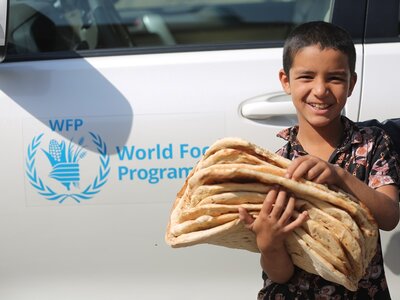Islamic Republic of Iran
- Over 3.4 million
- refugee and refugee-like populations
- 33,000
- refugees live in settlements
- 88 million
- population
The Islamic Republic of Iran, a lower-middle-income country with a population of 88 million, is hosting one of the largest and most protracted refugee populations in the world. Government figures indicate that over 3.4 million refugee and refugee-like populations are in Iran, living alongside host communities for the past 40 years. Predominantly hailing from Afghanistan and Iraq, these refugees, residing in urban areas and 20 settlements, grapple with challenges including limited job opportunities, lack of access to farmland and restrictions on livestock ownership. This affects their food security and contributes to health issues such as high blood pressure and diabetes.
WFP’s approach combines cash assistance through bank cards with the distribution of wheat flour and oil, allowing refugees flexibility in their food choices.
WFP has also addressed gender disparities and empowered young refugee girls through school-based programmes. These initiatives have significantly increased school enrolment, with more than 80 percent of school-aged girls now attending regularly, up from 30 percent two decades ago.
Departing from its traditional role, WFP supports various income-generating activities, fostering refugees' self-reliance and providing skills for sustainable income upon their return to their home countries when conditions permit. While WFP primarily focuses on refugee assistance, it also maintains the operational capacity to aid the government in emergency responses, serving as a reliable partner in sudden-onset crises that surpass national capacities.
What the World Food Programme is doing in Iran
-
Assistance to refugees
-
Using a blend of cash and in-kind support, WFP addresses 80 percent of the daily food requirements for food-insecure male-headed households and 100 percent, for female-headed households. This assistance is delivered through ATM debit cards, empowering refugees to make their own food choices. This approach also stimulates the economy within settlements, given that most food vendors are refugees. The cash assistance is complemented by wheat flour and oil, ensuring a consistent supply of this essential dietary staple for refugees.
-
School-based programmes
-
Iran's school meals programme provides daily snacks – including milk, biscuits and date bars – to 8,000 refugee girls and boys, along with 600 teachers, throughout the scholastic year. This initiative improves both learning and nutrition, while saving families money that they can spend on other essential needs. Also, families are encouraged to send their children to school in return for cash that every girl receives after each month of regular attendance, contributing to the household economy. This incentive can also dissuade parents from marrying girls off early.
-
Livelihoods
-
Tailoring workshops, greenhouses, welding workshops, bakeries and fish farming are among the livelihood opportunities WFP has made available to refugee women and men.
-
Cash transfers and other services to partners
-
WFP extends its cash transfer platform to partners delivering support to refugees in settlements. As the sector lead for logistics, WFP coordinates and provides expertise in warehousing and transportation of humanitarian items at the request of UNHCR and other humanitarian partners – particularly in response to potential new refugee influxes.
Iran (Islamic Republic of) news releases
Go to pagePartners and donors
Find out more about the state of food security in Iran (Islamic Republic of)
Visit the food security analysis pageOperations in Iran (Islamic Republic of)
Contacts
Office
No. 7, Nezami st., Ghoba St., Shariati Ave., Tehran, Iran
Iran







